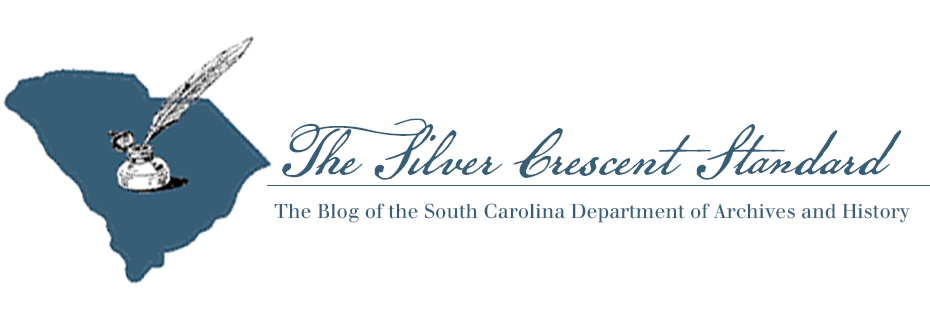
Although I was born in Virginia, I was raised here in South Carolina in Calhoun County. Growing up on a farm, my closest friends were the horses, cows and pigs that also took up residence on the homestead. Books, too, were an integral part of my bringing-up, especially history books. Following my graduation from high school, I had a brief (and ignominious) stint at the University of South Carolina. But once I “got my head on straight,” I returned to school and completed my degree in history and political science at the University of Arizona (go Wildcats!). During an interregnum period of a few years, I taught Social Studies at a local Tucson high school where I learned I did not have the patience nor the intestinal fortitude needed to be a teacher. I went back to school at UA where I earned a Masters degree in Information Resources and Library Science. Prior to starting work here at SCDAH in 2015, I worked as an archivist for the National Park Service. Some of my assignments included short term tours of duty to places like Little Bighorn National Monument, Grand Teton National Park, Fort Laramie National Historic Site, Glacier National Park, and Rocky Mountain National Park. I also spent three years as the archivist for Redwood National Park, Lassen Volcanic National Park and Whiskeytown National Recreation Area. Then fate (and a job opening) brought me back to South Carolina, the place I’ve always considered home.
What do you do as an Archival Processing Unit Supervisor?
As the Processing Supervisor, I manage the various activities which make archival collections accessible to the public. This is made up of two primary functions: processing and cataloging. The first, processing, is generally considered the preparation stage. In this phase, we do things like: determining the arrangement of materials that will best facilitate research; culling records which have no research, genealogical or legal value; rehousing documents in archival quality folders and boxes to ensure preservation; and identifying materials that contain personal privacy information or the documents that are too fragile to be handled. The cataloging stage is the point at which the processing archivist makes the records accessible to the public. We do this by recording the collection in a cataloging system (found here) and providing metadata like subject headings, collection title, dates, volume, and description. Now, in this digital age, our records are not limited to those you can hold in your hand – we also have a growing collection of electronic records and archived websites (found here) that also must be processed and cataloged. In addition, you’ll find me and the other folks from the processing unit in the Reference Room helping to answer all your research and genealogical questions.
Why did you want to be an Archivist?
I love history!! I knew I wanted a career that focused on history for as long as I can remember (well, at least since I figured out that I needed to know a lot of math and science to be a marine biologist or an astronaut). I wasn’t sure what direction that would take until I got to college and realized how much I enjoyed the research part of the history discipline. I was leaning toward a career in academic librarianship when I started graduate school but a last minute trip to the Ronald Reagan Presidential Library and a behind-the-scenes tour with the archival supervisor there sealed my fate. I was hooked! Holding little, one-of-a-kind pieces of history, no matter how insignificant or mundane, was (and still is) great fun.
Do you have a favorite collection or document?
When folks think of SCDAH, they usually think of the unpublished archival materials we hold. But for me, one of the most useful collections we have here is the book collection in the Reference Room. Though this is not a circulating library and books can’t be checked out, patrons can come in and use the books until their little hearts are content (or during regular business hours, whichever comes first). The library holds books like published family histories; historical and genealogical journals; the South Carolina Code of Laws; county histories and cemetery surveys; Revolutionary War, Civil War, World War I, and World War II rosters; census indexes; the published papers and biographies of important historical figures from the state; and general South Carolina and United States histories.
What is your favorite part of the job?
For me, I think, the best part of the job is when I’ve completed processing and cataloging a collection. There is something very rewarding about knowing the records I’ve worked on are now available for researchers to use. But more than that, it is gratifying to know that these documents are protected and preserved and will be available to South Carolinians for generations to come.
Who is your favorite historical figure or time period?
Oh, that’s tough. I guess I’d have to say that one of my favorite historical figures is William Barret Travis – South Carolinian, failed newspaperman and lawyer, and the commander at the 13 day siege and Battle of the Alamo in February/March 1836. He, along with fellow South Carolina native, James Butler Bonham, was killed while waiting for reinforcements at the former Catholic mission during the Texas Revolution. Travis famously wrote in a letter addressed “To the People of Texas and All Americans in the World” that if his call for reinforcements went unanswered that he was “determined to sustain myself as long as possible and die like a soldier who never forgets what is due to his own honor and that of his country.”
